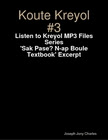Free Random Audio of Creole Lesson Episodes:
Storytelling: 2 Haitian Tales - 2 Kont Ayisyen
Haitian Foods - Manje Ayisyen
Thanksgiving Meals Audio
Free Sample Download of Haitian Creole CD
Introduction to Haitian Creole
Questions and Greetings in Creole - How are you? Kijan ou ye?
Haitian Creole Expressions
Audio for Body Parts in Creole
Popular Haitian Creole Expressions: Sa-k Pase? N-ap Boule….etc.
Listen to Creole audio
Listen to Kids’ Kreyol - Koute Kreyol pou Timoun
Review of Creole Nasal and Non-nasal Vowels
The Clothes We Wear:
New Year’s Eve Celebrations - Reveyon
Basic Creole Grammar Rules:
How do you say…..in Creole? Kouman nou di…. an Kreyol?
Spanish / Creole Lessons: Del Creole al Espanol
El Bicentenario de Mexico - Bisantne Meksiko
El habito de mascar goma en los Estados Unidos
Escuchen el Creole Haitiano Gratis - Listen to Haitian Creole for free
List of Free Direct Downloads of Haitian Creole Episodes
Welcome to Haitian Creole in no Time Podcast Intro
Listen to Lesson #1: Greetings
Listen to Lesson #2: Bilingual questions 3 languages
Listen to Lesson #3: Creole episodes
Listen to Lesson #6: Body parts
Listen to additional Lesson #6: Sa-k Pase? N-ap Boule
Listen to Lesson #7: Popular and Useful Creole/English Expressions
Listen to Dodo Tipitit, Popular Haitian lullaby
Listen to Lesson #8: News, Nouvel, Noticias
Listen to Lesson #9: Kreyol Pou Timoun Audio Sample
Listen to Lesson #10: Review of nasal and non-nasal vowels
Listen to Lesson #11: Creole Lesson for President and First Lady
Listen to Lesson / Leccion #12 - Creol en Espanol Gratis: Que Tal? Sa-k Pase…..
Listen to Lesson / Leccion #13 - Extracto Gratuito del Manual ‘Que Tal? - Sa-k Pase?
Listen to Lesson / Leccion #14 - Kreyol por Espanol
Listen to Lesson #15: Additional List of Haitian Creole expressions, phrases, and greetings
Listen to Lesson / Leccion #15 - Kreyol por Espanol, Del Creole al Espanol
Listen to Lesson #16 - Seasonal Clothes We Wear…
Listen to Lesson #16 - Popular Haitian Children’s Songs and Church Hymns
Listen to Lesson / leccion #17: Creole por Espanol - to like, to love, renmen, querer, gustar
Listen to Lesson #18: Listen to a sample of Acappella Songs of Hope
Listen to Lesson #19: Listen to Creole Verbs and Tense Markers
Lesson #20: Sing / Chante / Canten con nosotros - Debout Sainte Cohorte..
Listen to Lesson #22: Free Downloads of ‘Ann Pale Yon Ti Kreyol - Let’s Speak a Little Creole’
Listen to Lesson / Leccion #23 - Listen to ‘El Bicentenario de Mexico - Bisantne
Listen to Lesson #23 - Sing / Chante / Canten con nosotros - Ne Crains Rien, Je t’aime…
Listen to Lesson #24 - Listen to the free sample of ‘Sa-k Pase? N-ap Boule Textbook, pages 7-12
Listen to Lesson #25 - Sing / Chante / Canten con nosotros - Quelle Assurance Je suis sauve..
Listen to Lesson #26 - Listen to free Downloads of ‘Quick Haitian Creole Grammar Reference’ Textbook
Listen to Lesson #27 - Listen to ‘Tools and Supplies Vocabulary’
Listen to Lesson #28 - Listen to ‘Free Haitian Creole Download of Foods, Spices, and Fruit etc
Listen to Lesson #29 - Listen to ‘New Year’s Eve / Alavey Nouvel Ane..
Listen to Lesson #30 - Listen to Review of Basic Creole Grammar Rules, Pronunciation…
Listen to Lesson #31 - How Do You Say … in Creole: Haitian Holiday Celebrations
Listen to Lesson #33 - Listen to Word Market Carnival…
Listen to Lesson #34 - Listen to Haitian Creole CD
Listen to #35 -Listen to Krik! Krak! Haitian Tales / Kont Ayisyen
Listen to Lesson / Leccion #36 - Como Criar a un Bebe… en Creole
Listen to Lesson #37 - Vwala Se Te Yon Fwa / Once Upon a Time…Haitian Tales / Kont Ayisyen
Listen to Lesson #38 - Free excerpts of ‘Quick Haitian Creole Grammar Reference’
Listen to Lesson #40 - Listen to story ‘The Godfather’s Mercy - Parenn, Pran Pitye…
Listen to Lesson / Leccion #41 - Lista Gratuita de Verbos y Expresiones de Creole
Listen to Lesson #42 - Free excerpt of ‘Sa-k Pase? N-ap Boule Textbook’ - Chapter 1
Listen to Lesson #43 - Free excerpt of ‘Sa-k Pase? N-ap Boule Textbook’ - Chapter 2
Listen to Lesson #44 - Free Excerpt of ‘Sa-k Pase? N-ap Boule Textbook’ - Chapter 3































































